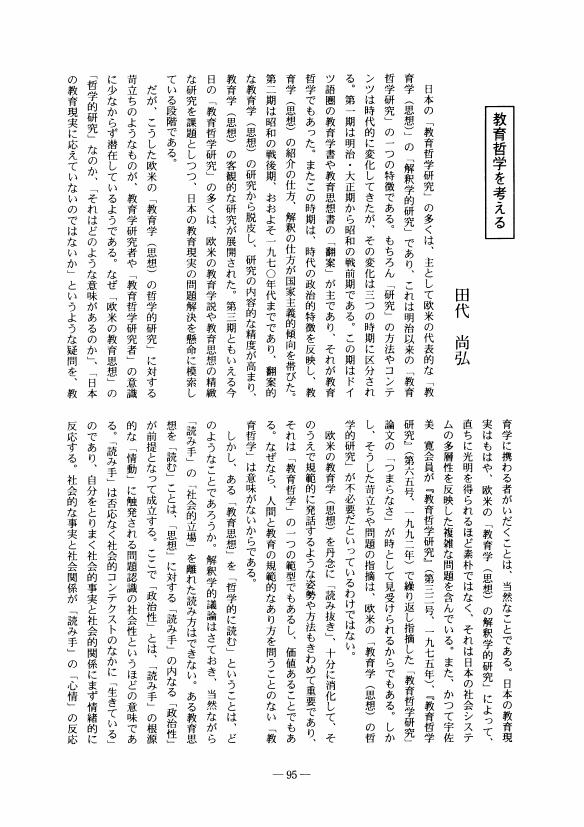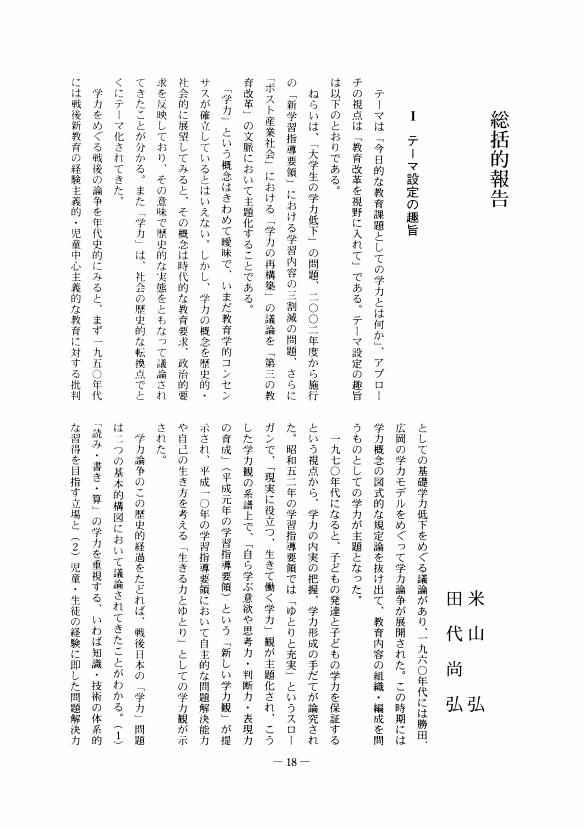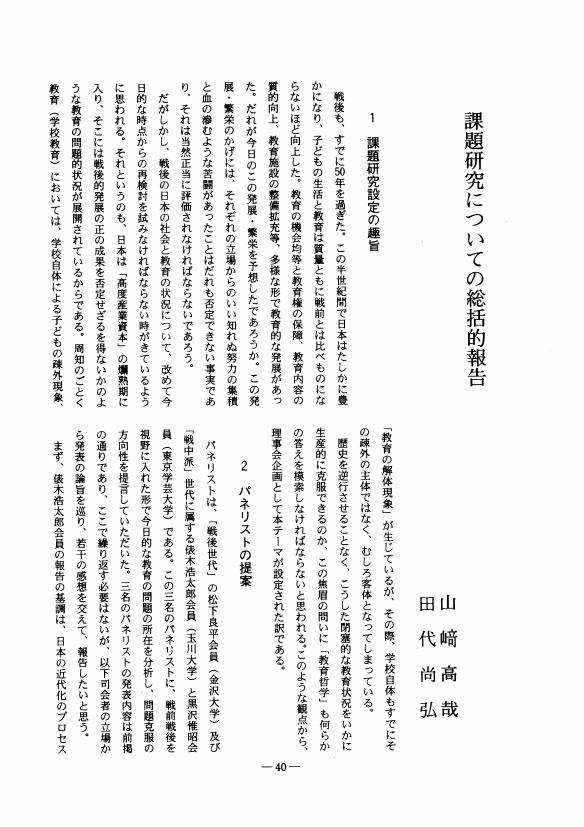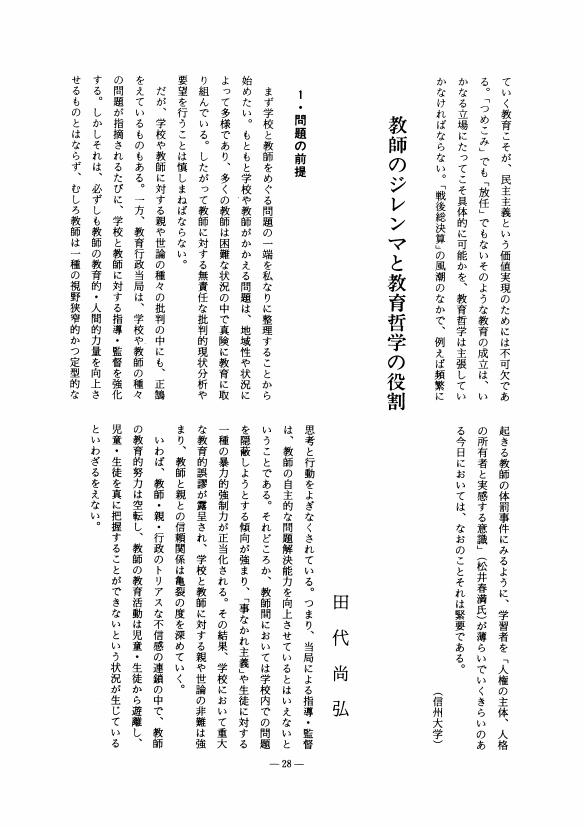1 0 0 0 OA E・シュプランガー、O・F・ボルノウとナチズム ナチズム期と戦後の思想
- 著者
- 田代 尚弘
- 出版者
- 日本ディルタイ協会
- 雑誌
- ディルタイ研究 (ISSN:09142983)
- 巻号頁・発行日
- vol.2009, no.20, pp.27-42, 2009 (Released:2022-02-03)
1 0 0 0 OA ディルタイ教育学の変容 ディルタイとシュプランガー
- 著者
- 田代 尚弘
- 出版者
- 日本ディルタイ協会
- 雑誌
- ディルタイ研究 (ISSN:09142983)
- 巻号頁・発行日
- vol.2006, no.17, pp.35-50, 2006 (Released:2022-02-03)
1 0 0 0 OA 教育哲学を考える
- 著者
- 田代 尚弘
- 出版者
- 教育哲学会
- 雑誌
- 教育哲学研究 (ISSN:03873153)
- 巻号頁・発行日
- vol.2003, no.87, pp.95-96, 2003-05-10 (Released:2009-09-04)
1 0 0 0 OA 西村晧・牧野英二・舟山俊明編『ディルタイと現代』
- 著者
- 田代 尚弘
- 出版者
- 教育哲学会
- 雑誌
- 教育哲学研究 (ISSN:03873153)
- 巻号頁・発行日
- vol.2002, no.86, pp.56-58, 2002-11-10 (Released:2009-09-04)
1 0 0 0 OA 総括的報告
- 著者
- 米山 弘 田代 尚弘
- 出版者
- 教育哲学会
- 雑誌
- 教育哲学研究 (ISSN:03873153)
- 巻号頁・発行日
- vol.2001, no.83, pp.18-22, 2001-05-10 (Released:2009-09-04)
1 0 0 0 OA 課題研究についての総括的報告
- 著者
- 山崎 高哉 田代 尚弘
- 出版者
- 教育哲学会
- 雑誌
- 教育哲学研究 (ISSN:03873153)
- 巻号頁・発行日
- vol.1997, no.75, pp.40-46, 1997-05-10 (Released:2010-01-22)
1 0 0 0 OA 増渕幸男著『ヤスパースの教育哲学研究』
- 著者
- 田代 尚弘
- 出版者
- 教育哲学会
- 雑誌
- 教育哲学研究 (ISSN:03873153)
- 巻号頁・発行日
- vol.1990, no.62, pp.78-82, 1990-11-10 (Released:2009-09-04)
1 0 0 0 OA シュプランガーの宗教的人間観への一考察
- 著者
- 田代 尚弘
- 出版者
- 教育哲学会
- 雑誌
- 教育哲学研究 (ISSN:03873153)
- 巻号頁・発行日
- vol.1988, no.58, pp.1-14, 1988-11-10 (Released:2009-09-04)
- 参考文献数
- 30
The purpose of this paper is to examine the problem of Spranger's 'view of man'. The clarification of this problem is de facto connected with Spranger's value theory, his ethical and religious ideas. It is noteworthy that Spranger deducts two ethical models from religion. These are the 'expanded ethics' (die erweiternde Ethik) and the 'limiting ethics' (die beschränkende Ethik); both stand in contradiction to each other, hence man experiences an ethical contradiction. But man's character matures by overcoming this ethical contradiction and he becomes the appropriate subject of value judgment and action and thus is able to lead a meaningful life. According to Spranger man realizes that he is protected by God when he listens to the voice of God speaking to him through the conscience. I have characterised this interpretation of the nature of man by Spranger as his religious view of man. This religious view of man forms also one characteristic attribute of Spranger's educational theory.At the background of this religious view of man rests the idea of 'world piety' (Weltfrommigkeit); this implies a salvation from secular worldliness and approaching the Holy, by overcoming the worldly sufferings through living in the world. In my mind, Spranger's religious view of man can make an important contribution to the ethical foundations of contemporary education and to the ethos of the educator.
1 0 0 0 OA 教師のジレンマと教育哲学の役割
- 著者
- 田代 尚弘
- 出版者
- 教育哲学会
- 雑誌
- 教育哲学研究 (ISSN:03873153)
- 巻号頁・発行日
- vol.1987, no.55, pp.28-32, 1987-05-10 (Released:2009-09-04)
- 参考文献数
- 6
1 0 0 0 OA E・シュプランガーにおける「良心教育」の実践的・政治的目標 戦後民主主義との関連で
- 著者
- 田代 尚弘
- 出版者
- 教育哲学会
- 雑誌
- 教育哲学研究 (ISSN:03873153)
- 巻号頁・発行日
- vol.1986, no.53, pp.47-60, 1986-05-10 (Released:2010-01-22)
- 参考文献数
- 62
The purpose of this paper is to clarify the moral (practical) and political side of the goal of postwar Spranger's education of the conscience. One problem which Spranger after living through the Nazi period faced in the formation of democracy was the phenomenon of lack of individual conscience which is supposed to support democracy. According to Spranger the lack of conscience in the single individual leads to a break-down of democracy. What he calls 'education of the conscience' aimed at the formation of men who support democracy at their interior spirit. In this paper this problem shall be discussed from the following viewpoints. First, I shall try to arrive at an understanding of the characteristics of Spranger's view of the conscience, then proceed to explain the social meaning of conscience by examining the connection of conscience and cultural criticism, and then go on to discuss the content of the goal of conscience education from the viewpoint of reconstruction of democracy in postwar Germany.
1 0 0 0 OA 『教育の根底にあるもの』長井和雄教授還暦記念論集
- 著者
- 田代 尚弘
- 出版者
- 教育哲学会
- 雑誌
- 教育哲学研究 (ISSN:03873153)
- 巻号頁・発行日
- vol.1985, no.52, pp.100-103, 1985-11-10 (Released:2009-09-04)
- 著者
- 田代 尚弘
- 出版者
- 一般社団法人日本教育学会
- 雑誌
- 教育學研究 (ISSN:03873161)
- 巻号頁・発行日
- vol.75, no.1, pp.109-111, 2008-03-31









